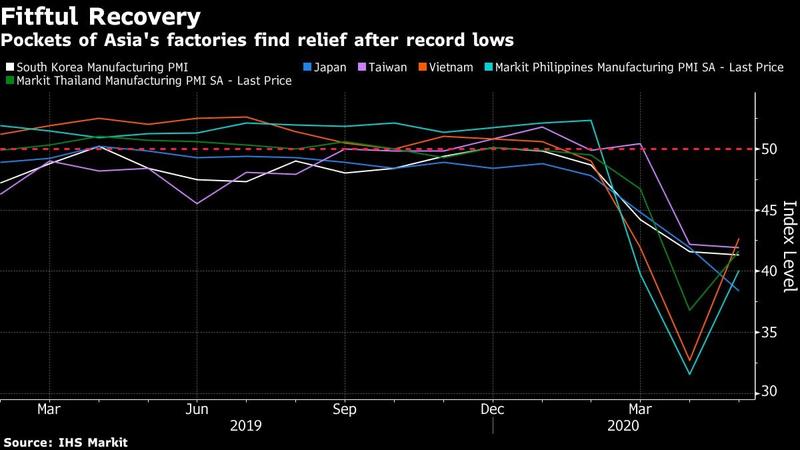 The sun sets behind industrial plants in the Keihin industrial area of Kawasaki, Kanagawa Prefecture, Japan, May 17, 2020. (TORU HANAI / BLOOMBERG)
The sun sets behind industrial plants in the Keihin industrial area of Kawasaki, Kanagawa Prefecture, Japan, May 17, 2020. (TORU HANAI / BLOOMBERG)
Asia’s factory managers remained downbeat about the world’s trade engines in May, even as battered economies start to reopen across the region.
Purchasing managers indexes for South Korea, Japan and Taiwan fell, according to data released by IHS Markit on Monday. Readings for Vietnam, Malaysia, Thailand and the Philippines improved but remained below 50, the dividing line between contraction and expansion.
The factory data underscore the fragile and uneven recovery expected in Asia as prospects continue to weaken for economies in the northeast.
ALSO READ: China's manufacturing PMI down slightly in May

Northeast Asia “has had more success in containing the virus, which has led to quicker recovery in mobility and bodes well for domestic demand, but they still have to contend with a very weak external environment and a potential downturn in the semiconductor sector,” said Priyanka Kishore, head of India and Southeast Asia economics at Oxford Economics Ltd. in Singapore.
In South Korea, a bellwether for global trade, exports posted another double-digit decline in May. Overseas shipments fell 24% from a year earlier, the trade ministry said Monday, compared with economists’ forecast of a 25% contraction
ALSO READ: Asia's factory activity plunges as coronavirus shock deepens
High-frequency figures recently have shown an uptick in global demand, with risks that the recovery across economies will be uneven without a vaccine for the coronavirus.
Manufacturing gauges are signaling more relief so far than services sectors, with governments only now beginning to ease lockdowns and allow for more mobility of consumers.
India, which started to lift the strictest stay-at-home rules in late April, saw its manufacturing sector recover a bit, though business conditions remained weak and companies cut staff. The manufacturing PMI rose to 30.8 in May from 27.4 in April, but remained well in contraction territory for the second straight month.
In South Korea, a bellwether for global trade, exports posted another double-digit decline in May. Overseas shipments fell 24 percent from a year earlier, the trade ministry said Monday, compared with economists’ forecast of a 25 percent contraction.
READ MORE: Global industrial and supply chains set to change
For now, there appear to be few signs of a turnaround in South Korean exports without broader global demand also picking up.
“It seems unlikely that conditions will allow for a robust pick-up in demand any time soon,” IHS Markit economist Joe Hayes said in a statement. “Below-capacity operating rates will also essentially cap potential growth in the near-term.”


